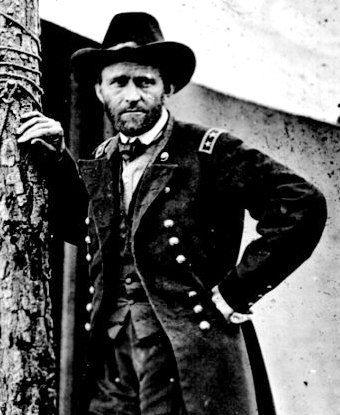Last updated: March 29, 2024
Person
Ulysses S. Grant

Ulysses S. Grant at Cold Harbor, June 1864
Hiram Ulysses Grant was born April 27, 1822, in Point Pleasant, Ohio, the first child of Jesse and Hannah Grant.
When Ulysses was one year old, his family moved to the nearby town of Georgetown. Jesse Grant supported the family as a tanner making animal hides into leather. Ulysses did not like working at the tannery. Instead, he would take care of the family farm, and care for the animals, especially horses. He attended several grade schools in Ohio and in Maysville, Kentucky, and thought about becoming a math teacher. When Grant stated that he would like to go to college, his father got him an appointment to the U.S. Military Academy at West Point, New York. By mistake, his name was listed on the roster as Ulysses S. Grant, and although he tried to correct it upon entering the Academy, they informed him it would require a new appointment. Knowing this would upset his father, Ulysses accepted the change. His classmates soon nicknamed him United States or Uncle Sam Grant, and then called him Sam Grant.
Ulysses graduated from West Point in 1843, 21st out of 39 cadets graduating that year. He was assigned to the 4th U.S. Infantry regiment stationed at Jefferson Barracks near St. Louis, Missouri. Ulysses' roommate his last year at West Point was Fred Dent, who had grown up at a nearby plantation called White Haven. Grant was invitied to visit the home, and during a visit in February 1844 he met one of Fred's sisters, Julia Dent Grant. The two fell in love and became engaged before Ulysses was stationed further south. During the Mexican War, Grant served in nearly every major battle of the war and was twice brevetted for bravery. Ulysses and Julia married in St. Louis in 1848 after the conclusion of the Mexican American war. Grant was assigned to several different posts before resigning from the army in 1854 to try his hand at farming in St. Louis at White Haven. Grant struggled on the farm, however, and in early 1860 the family moved to Galena, Illinois, where Ulysses worked as a clerk at his father’s general store.
With the outbreak of the Civil War in April 1861, Grant offered his services to the U.S. military and quickly rose to fame following his victories at Forts Henry and Donelson, where he earned the nickname "Unconditional Surrender" Grant. He rose through the ranks and was appointed by President Lincoln to become commanding general of all Union armies in March 1864. Grant supported Lincoln's war aims of union and freedom for the nearly 4 million African American enslaved individuals in the South. Following Lincoln's enactment of the Emancipation Proclamation, Grant made sure that the enslaved men, women, and children who escaped to Union lines were protected and cared for. After being promoted, Grant worked diligently to bring an end to the war. He accepted Confederate General Robert E. Lee's surrender of the Army of Northern Virginia on April 9, 1865, effectively ending the Civil War.
After the Civil War Grant was elected the 18th President of the United States in 1868. During his two terms, Grant supported and signed the 15th Amendment to the Constitution, giving African American men the right to vote. His Native American “peace policy” revised government relations with Native Americans and attempted to protect Indians from people who wanted their land, although the results of these policies were mixed. He sought free public education for all, regardless of race, gender, or religion. On March 1, 1872 Grant signed legislation establishing Yellowstone as the nation's first national park. In international affairs, he peacefully settled major disputes with England over its support for the Confederacy during the Civil War, setting up a framework for international arbitration. And, contrary to popular depictions of Grant’s administration being one of the most corrupt in U.S. history, President Grant instituted civil service reform in the executive branch to reduce the negative effects of patronage and the spoils system. The recommendations of the Civil Service Commission would not become law until after President Garfield's assassination in 1881.
Once the Grants left the White House, they embarked on a two-year world tour and settled in New York City. To offset the loss of his personal fortune to a Wall Street scam, Grant wrote his memoirs of the Civil War, which were completed just a few days before his death from throat cancer on July 23, 1885. Published posthumously, The Personal Memoirs of U. S. Grant is still considered one of the best military commentaries ever written.
